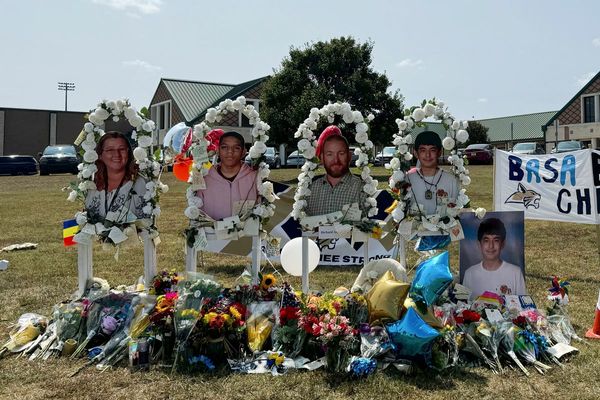
The Australian ambassador to the US, Kevin Rudd, says it is up to the American people whether Donald Trump returns to the White House – an outcome he previously said would “fray” support for the US alliance in Australia.
The former Australian prime minister said on Wednesday that US politics was “a complex beast” and he was focused on keeping on good terms with both sides of the aisle, including former Trump officials.
Rudd said he was also focused on securing US legislation to enable tech collaboration under the Aukus pact, but likened it to “a complex process of sausage-making”.
Rudd is well connected in Washington and is close to senior figures in the Biden administration and establishment Republicans, but has previously been an outspoken critic of Trump.
Prior to his appointment as ambassador, which took effect earlier this year, Rudd called Trump “the most destructive president in history”.
Rudd told Guardian Australia before the 2020 election that if Trump were re-elected, “the overall fabric of domestic political support in this country and among other American allies around the world will begin to more fundamentally fray”.
Rudd had a more diplomatic message when he spoke to reporters outside Old Parliament House in Canberra on Wednesday.
Asked what preparations he was making for the possibility of another Trump administration, Rudd said both the US and Australia were “robust democracies”.
Since taking up the diplomatic posting, Rudd said he had “worked comfortably and seamlessly” with House Speaker, Kevin McCarthy, and Senate minority leader, Mitch McConnell.
Rudd said he had also spoken with Republican House and Senate leaders from across the US congressional system “and also with former members of the Trump administration from last time round”.
“That’s our job as an embassy and that’s my job as ambassador. What the good burghers [people] of the United States choose to do in their own electoral process is a matter for them – from which, thankfully, Australian ambassadors are immune from comment.”
Rudd’s comment was an adaptation of “the good burghers of Griffith” – a phrase he had previously used in reference to the voters in the electorate he previously held in the Australian parliament.
Despite Trump facing multiple indictments, including over the attempt to overturn the 2020 election results, the former president remains the frontrunner to secure the Republican nomination for the 2024 election.
Although it remains very early in the cycle, the current general election polling suggests Joe Biden and Trump are closely matched.
Rudd expressed confidence in the prospect of passing US legislation to enable both elements of the Aukus: Australia’s acquisition of nuclear-powered submarines and collaboration on other advanced defence technology.
After speaking with committee chairs and ranking members in the US Senate and Congress, Rudd said Aukus enjoyed “quite a remarkable level of bipartisan support” but there would always be “pretty colourful debate”.
Republicans have raised concerns the US could fall short on its own needs when selling Australia at least three Virginia-class submarines in the 2030s, but Rudd said it was normal for elected members to reflect “their own industry policy concerns and their own constituency concerns”.
Australia has already earmarked about $3bn over the next four years to boost the submarine sustainment and production capacity of the US and the UK.
Most of this is expected to go to the US, and Rudd played down the idea Australia would be asked to tip in more funds.
“No one that I’ve met in the United States has challenged what we’re proposing to do and the impact of what we ourselves will do in terms of adding to their industrial capacity,” he said.
Hinting the US may make further investments in its own submarine industrial base, Rudd predicted the issue would be resolved through negotiations “between the administration and relevant senators”.
Rudd said he would continue to convey the Australian government’s position that the case against the WikiLeaks founder Julian Assange had “gone on for too long”, but likely behind the scenes “in order to maximise our prospects”.
Rudd was speaking on his way into a Tech Council of Australia event, where he said Australia and the US were serious about collaborating on renewable energy and critical minerals.







